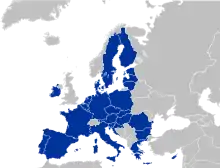Directorate-General for Migration and Home Affairs
The Directorate-General for Migration and Home Affairs (DG HOME) is a Directorate-General of the European Commission. The role of the body is to ensure the EU's security, to build a common EU migration and asylum policy, and to promote dialogue and cooperation with non-EU countries.[1] Thereby, it contributes to the Area of Freedom, Security and Justice (AFSJ).
 |
|---|
| This article is part of a series on the politics and government of the European Union |
|
|
Structure
- Directorate A: Strategy and General Affairs
- Directorate B: Borders, Interoperability and Innovation
- Directorate C: Migration, Protection and Visas
- Directorate D: Law Enforcement and Security
- Directorate E: Migration and Security Funds; Financial Resources
- Directorate F: Financial Audit, Data Management and Risk Assessment
Additionally, there are the following Migration and Home Affairs Agencies:
The current Director-General of DG HOME is Monique Pariat.[2] She can be deputised by one of two Deputy Directors-General including one who is responsible for "migration" policies (currently vacant) and one in charge of "security" policies, currently Mr. Olivier Onidi. The department operates under the political authority of Ms. Ylva Johansson, the European Commissioner for Home Affairs.
Directorate A: Strategy and General Affairs
This Directorate is made up of four policy coordination units (1) Policy Coordination and Interinstitutional relations, (2) Communication, Agencies and Networks Coordination, (3) International Strategy, and (4) Legal Affairs.
Directorate B: Borders, Interoperability and Innovation
This Directorate is made up of four policy units (1) Borders and Schengen, (2) Schengen Evaluation, (3) Information Systems for Borders, Migration and Security, and (4) Innovation and Industry for Security.
Directorate C: Migration, Protection and Visas
This Directorate is made up of five policy units (1) Irregular Migration and Return Policy, (2) Legal Pathways and Integration, (3) Asylum, (4) Migration management support, and (5) Visa Policy.
Directorate D: Law Enforcement and Security
This Directorate is made up of five policy units (1) Police cooperation and Information exchange, (2) Counter-Terrorism, (3) Prevention of Radicalisation, (4) Cybercrime, and (5) Organised crime and drugs policy.
Directorate E: Migration and Security Funds; Financial Resources
This Directorate is made up of five financial policy units (1) Funds Programming and Procedures, (2) National programmes and EMAS for South and East Europe, (3) National programmes and EMAS for North and West Europe and Schengen Associated Countries, (4) Union actions and Procurement, and (5) Budget and Reporting.
Directorate F: Financial Audit, Data Management and Risk Assessment
This Directorate is made up of two units (1) Assurance, Audit and Compliance and (2) Situational Awareness, Resilience and Data Management.
In order to achieve its goals, the European Commission has published several policy agendas. Current major agendas related to the DG HOME are the Security Union Strategy (2020),[3] the European Agenda on Migration (2015),[4] and the Cybersecurity Strategy for the European Union (2013).[5] Other major agendas are the EU Global Strategy (2016),[6] the White Paper on the Future of Europe (2017),[7] the European Energy Security Strategy (2014).[8]
History
DG HOME was created in 2010 when the DG Justice, Freedom and Security was split into DG HOME and the Directorate-General for Justice.[9]
See also
- European Civil Service (i.a. for all DGs)
- European Commissioner for Home Affairs
- European Commissioner for Justice, Fundamental Rights and Citizenship
- Directorate-General for Justice and Consumers
- Justice and Home Affairs Council (Council of the European Union)
- Area of Freedom, Security and Justice
- Charter of Fundamental Rights of the European Union
- Four Freedoms
- European Convention on Human Rights
- Universal Declaration of Human Rights
- Police and Judicial Co-operation in Criminal Matters
References
- "DG HOME: About us". 13 October 2017. Retrieved 13 October 2017.
- https://ec.europa.eu/home-affairs/who-we-are/director-general_en. Missing or empty
|title=(help) - https://ec.europa.eu/home-affairs/what-we-do/policies/security-union-strategy_en. Missing or empty
|title=(help) - https://ec.europa.eu/home-affairs/what-we-do/policies/european-agenda-migration_en. Missing or empty
|title=(help) - "EU Cybersecurity plan to protect open internet and online freedom and opportunity - Cyber Security strategy and Proposal for a Directive". 2013. Retrieved 13 October 2017.
- "Shared Vision, Common Action: A Stronger Europe A Global Strategy for the European Union's Foreign And Security Policy" (PDF). 2016. Retrieved 13 October 2017.
- "The White Paper on the Future of Europe" (PDF). 2017. Retrieved 13 October 2017.
- "European Energy Security Strategy". 2014. Retrieved 13 October 2017.
- "Commission completes internal reshuffle". EurActiv. 3 June 2010.
External links
- DG HOME Website
- Organisation Chart of DG HOME
- The Commissioners - official homepage
- Commissioner for Home Affairs- official homepage





